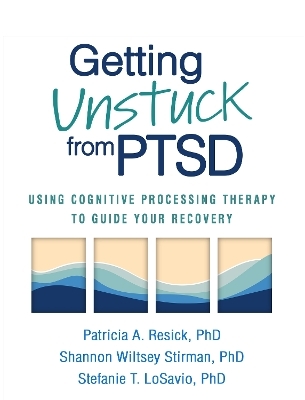
Getting Unstuck from PTSD
Guilford Press (Verlag)
978-1-4625-4983-2 (ISBN)
Are you having trouble getting back to normal after a frightening experience? Do you feel stuck second-guessing what you did or did not do in the moment? Do you find yourself avoiding places, people, or sensations that remind you of what happened? Problems like these may be symptoms of posttraumatic stress disorder (PTSD). The good news is that recovery is possible. This is the first self-help workbook based on cognitive processing therapy (CPT), one of the gold-standard treatments for PTSD. Leading authorities--including the originator of CPT--have created a complete program featuring step-by-step exercises, practical tools that you can download and print as needed, and empathic stories of people working toward recovery. Using CPT techniques to systematically reexamine unhelpful thoughts can make the memories less painful and overwhelming. It can help you strengthen your relationships and restore a sense of safety and trust. Learn how to get unstuck from what happened in the past--so you can build the life you want now.
Winner (Second Place)--American Journal of Nursing Book of the Year Award, Consumer Health Category
Mental health professionals, see also Cognitive Processing Therapy for PTSD, Second Edition, by Patricia A. Resick, Candice M. Monson, and Kathleen M. Chard, the authoritative CPT treatment manual for clinicians.
Patricia A. Resick, PhD, ABPP, is Professor Emeritus of Psychiatry and Behavioral Sciences at Duke University School of Medicine. She developed cognitive processing therapy (CPT) in 1988 at the University of Missouri–St. Louis, where she founded the Center for Trauma Recovery and was an Endowed Professor. For a decade, she was Director of the Women’s Health Sciences Division of the National Center for PTSD. She has conducted numerous randomized controlled trials of CPT with civilians and active-duty military. Dr. Resick has served as president of the International Society for Traumatic Stress Studies (ISTSS) and the Association for Behavioral and Cognitive Therapies (ABCT). She is the recipient of numerous research and mentoring awards, including Lifetime Achievement Awards from Division 56 (Trauma Psychology) of the American Psychological Association, ISTSS, and ABCT. Shannon Wiltsey Stirman, PhD, is Professor in the Department of Psychiatry and Behavioral Sciences at Stanford University. She has been working with people with posttraumatic stress disorder (PTSD) and conducting research on PTSD since the early 2000s. Dr. Wiltsey Stirman provides training and consultation in cognitive processing therapy and cognitive-behavioral therapy and studies their effectiveness and their implementation in public mental health settings. She has a particular interest in developing digital mental health tools and other approaches to make effective treatment more widely available outside the context of traditional therapy. Stefanie T. LoSavio, PhD, ABPP, is Assistant Professor in the Department of Psychiatry and Behavioral Sciences at the University of Texas Health Science Center at San Antonio and Director of Research and Innovation at the STRONG STAR Training Initiative. Dr. LoSavio specializes in evidence-based treatments for posttraumatic stress disorder (PTSD) and co-occurring conditions. She is a national cognitive processing therapy trainer and has provided consultation for numerous research trials and training initiatives. Her research focuses on the effectiveness of interventions for PTSD and adaptations to treatments and training methods to increase the reach of evidence-based care.
I. Introduction: How People Get Stuck in PTSD and How to Get Unstuck
1. Overview of This Book
2. How PTSD Keeps You Stuck
3. Making a Plan to Get Unstuck from PTSD
II. Identifying Where You Are Stuck
4. Introduction to PTSD and Trauma Recovery
5. Processing the Meaning of Your Trauma and Building a Stuck Point Log
6. Identifying Thoughts and Feelings
III. Getting Unstuck from Beliefs about the Trauma
7. Beginning to Examine Your Worst Traumatic Event
8. The Exploring Questions Worksheet
9. Introducing Thinking Patterns
10. Using the Alternative Thoughts Worksheet to Balance Your Thinking
IV. Getting Unstuck from Trauma-Related Beliefs about the Present and Future
11. Safety
12. Trust
13. Power and Control
14. Esteem
15. Intimacy
V. Moving Forward
16. Finishing Cognitive Processing Therapy
17. Conclusion
Appendix
Resources
Index
| Erscheinungsdatum | 22.03.2023 |
|---|---|
| Verlagsort | New York |
| Sprache | englisch |
| Gewicht | 560 g |
| Themenwelt | Medizin / Pharmazie ► Medizinische Fachgebiete ► Notfallmedizin |
| Medizin / Pharmazie ► Medizinische Fachgebiete ► Psychiatrie / Psychotherapie | |
| Sozialwissenschaften ► Pädagogik ► Sozialpädagogik | |
| Sozialwissenschaften ► Soziologie | |
| ISBN-10 | 1-4625-4983-7 / 1462549837 |
| ISBN-13 | 978-1-4625-4983-2 / 9781462549832 |
| Zustand | Neuware |
| Haben Sie eine Frage zum Produkt? |
aus dem Bereich


